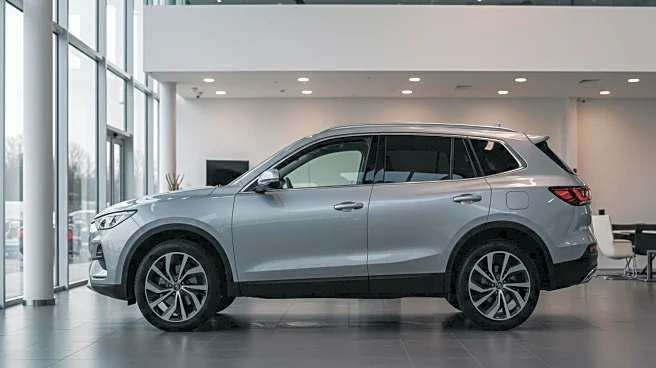What's Happening?
A Volkswagen salesman in Greensburg, Pennsylvania, has expressed frustration over the limited supply of the 2025 Tiguan SEL R-Line, a popular midsize SUV. The dealership has received only one unit in months, despite high customer demand. The Tiguan is praised for its premium features at a competitive price, including leather seats, a heads-up display, and a panoramic sunroof. However, production delays at Volkswagen's Wolfsburg plant, due to software integration challenges and parts shortages, have contributed to inventory issues. This situation reflects broader supply chain disruptions affecting the auto industry.
Why It's Important?
The scarcity of the Volkswagen Tiguan highlights ongoing challenges in the automotive industry, particularly in managing supply chain disruptions and meeting consumer demand. The limited availability of popular models can impact dealership sales and customer satisfaction, potentially leading to higher prices and longer wait times. This situation underscores the need for automakers to address production bottlenecks and optimize inventory management. It also raises questions about strategic decisions to maintain tight supply, which could be aimed at preserving pricing power amid rising demand.
What's Next?
Volkswagen may need to enhance production capabilities and streamline supply chain operations to meet the demand for the Tiguan and other popular models. This could involve investing in technology and infrastructure to overcome software and parts challenges. Additionally, dealerships might explore alternative strategies, such as preorders or deposits, to manage customer expectations and secure sales. The focus on resolving inventory issues could lead to improved collaboration between manufacturers and suppliers, ensuring a more resilient and responsive automotive market.
Beyond the Headlines
The inventory challenges faced by Volkswagen dealerships reflect broader trends in the automotive industry, including shifts towards electrification and changing consumer preferences. As automakers invest in electric vehicle production, traditional models like the Tiguan may receive less attention, impacting availability. This transition raises questions about the future of combustion-powered vehicles and the role of dealerships in adapting to new market dynamics. The situation also highlights the importance of innovation and flexibility in responding to evolving industry challenges.










